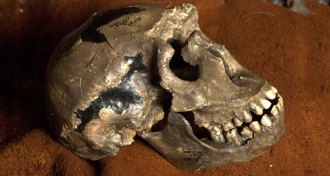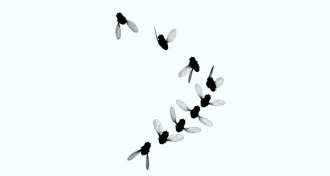Uncategorized
-
 Anthropology
AnthropologyEarliest case of a battered child found in Greece
A baby living in Athens around 2,200 years ago was probably beaten to death.
By Bruce Bower -
 Earth
EarthHuge space rock rattled Earth 3 billion years ago
An asteroid almost as wide as Rhode Island may have plowed into Earth 3.26 billion years ago, leaving a trace in South Africa’s Barberton greenstone belt.
-
 Anthropology
AnthropologyAncient boy died surprisingly young
Imaging analysis reduces age of Australopithecus sediba youngster from 9 to 7.5 years old.
By Bruce Bower -
 Climate
ClimateReef fish act drunk in carbon dioxide–rich ocean waters
In first test in the wild, fish near reefs that bubble with CO2 lose fear of predators’ scent.
By Meghan Rosen -
 Anthropology
AnthropologyTurkana Boy sparks row over Homo erectus height
Estimating the adult height and weight of an ancient youth from his skeleton has proven tricky.
By Bruce Bower -
 Climate
ClimateOcean bacteria may have shut off ancient global warming
Ocean-dwelling bacteria may have helped end global warming 56 million years ago by gobbling up carbon from the CO2-laden atmosphere.
-
 Climate
ClimateIPCC calls for swift switch to alternative power
Rapid adoption of green power production will be necessary to avert a climate crisis, latest IPCC report says.
By Beth Mole -
 Astronomy
AstronomyEarly Mars couldn’t hold liquid water long
Small rocks hit Mars 3.6 billion years ago, suggesting an early atmosphere too thin for liquid water to hang around very long.
-
 Particle Physics
Particle PhysicsExotic particle packs a foursome of quarks
Tetraquarks could help physicists understand the universe’s first generations of matter.
By Andrew Grant -
 Genetics
GeneticsFive mutations could make bird flu spread easily
Handful of alterations can turn H5N1 bird flu into virus that infects ferrets through the air.
-
 Cosmology
CosmologyGalaxy’s gamma-ray glow may expose dark matter
An excess of gamma rays at the center of the Milky Way could be a signature of dark matter.
By Andrew Grant -
 Life
LifeIn a crisis, fruit flies do stunt turns
An elaborate monitoring system reveals that fruit flies can execute sophisticated flying maneuvers in the face of danger.
By Susan Milius